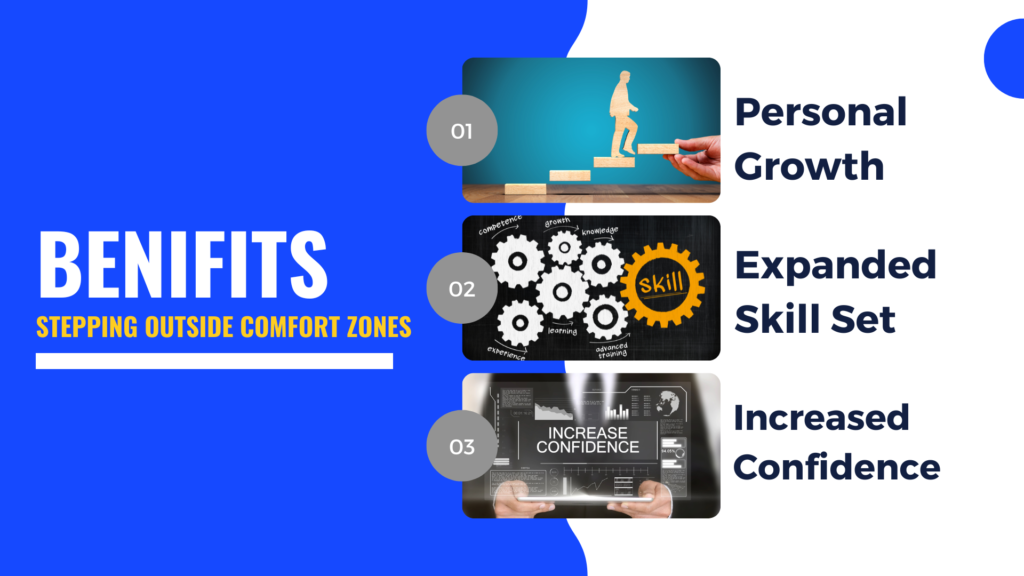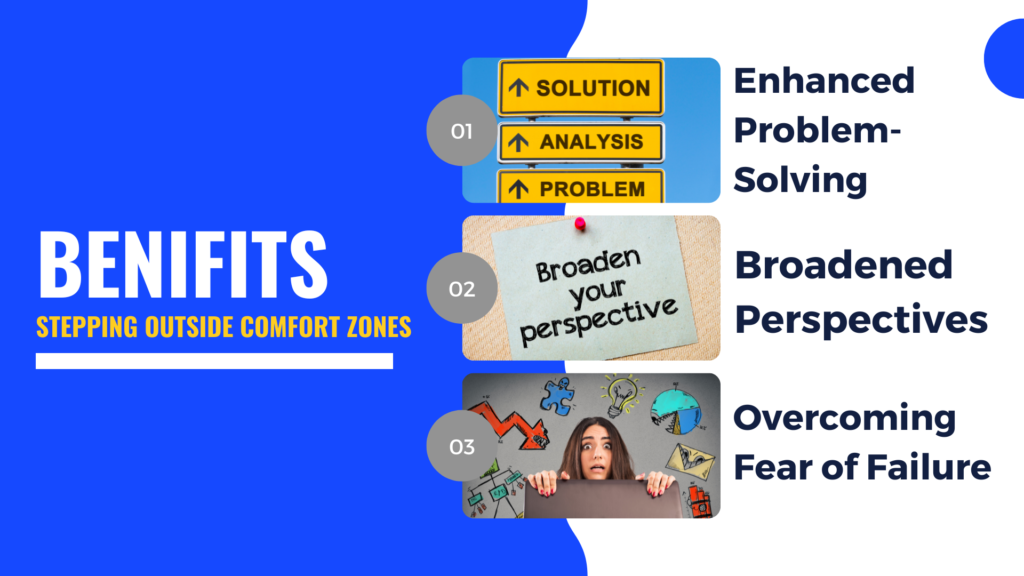Why 87% of High Performers Attribute Their Success to Stepping Outside Comfort Zones

Introduction:
Have you ever wondered why some people achieve great things in life? Well, many successful people believe in stepping outside their comfort zones. A study found that a whopping 87% of high achievers say they could succeed because they left their comfort zones. But what does that mean? Discover why taking risks and trying new things can lead to success!

Exploring New Things:
When we say “stepping outside your comfort zones,” we mean doing things that may be scary or uncomfortable initially. It can be as simple as trying a new sport, joining a club, or even giving a presentation in front of a big audience. High achievers often try new things because they know they can learn and grow by encouraging themselves. They know that staying in their comfort zone may be safe, but it only offers a few opportunities for growth and success.

Building Confidence:
One of the reasons why stepping outside our comfort zones is essential is because it helps us build confidence. Trying something new and succeeding boosts us and makes us believe in ourselves even more. Each time we face and overcome a challenge, we become stronger and more confident. High achievers know this, and they embrace new opportunities to develop their skills.
Learning from Failure:
Sometimes, things go differently than planned when we step outside our comfort zones. Make mistakes or face setbacks. But here’s the secret: failure is not the end; it’s a stepping stone to success. High performers understand that failure is a part of the learning process. When they encounter obstacles, they don’t give up. Instead, they learn from their mistakes, adjust, and try again. They accept failure as a chance to grow and become more helpful for better preparation for future problems.
Discovering Hidden Talents:
Another great thing about stepping outside your comfort zone is discovering hidden talents and passions. When we try new things, we may excel at something we never knew we were good at. High achievers have no hesitation in trying new things because they know it could lead them to something they love. By discovering their passions, they can focus their efforts and talents on areas that bring them joy and fulfillment.
Benefits of Stepping Outside Comfort Zones
Stepping outside of comfort zones can be beneficial; here are some advantages of embracing new challenges and pushing beyond familiar boundaries :

Personal Growth:
Stepping outside of comfort zones encourages personal growth and development. Students can build resilience, self-confidence by trying new things and taking risks. They learn how to deal with problems, adapt to new situations, and use their strengths and skills.

Expanded Skill Set:
Venturing outside of comfort zones exposes new experiences and opportunities to get new skills. It helps them explore different subjects, hobbies, or activities they have considered before. Engaging in diverse activities allows us to discover passions and develop a more versatile skill set.
Increased Confidence:
Accomplishing tasks outside of one’s comfort zone can boost confidence. When we succeed in unfamiliar situations and challenges, we gain belief in our abilities. This newfound confidence can extend beyond the specific task and impact other areas of life.
Enhanced Problem-Solving Abilities:
Stepping outside of comfort zones often requires problem-solving and critical thinking skills. Students learn to analyze situations, think, and solve new challenges. These problem-solving abilities are transferable and help in various academic and real-life scenarios.

Broadened Perspectives:
Exploring unfamiliar territory exposes students to diverse perspectives, cultures, and ideas. It fosters open-mindedness and empathy, allowing students to understand and appreciate different viewpoints. This exposure to other things helps them become well-rounded people who know more about the world.
Overcoming Fear of Failure:
Fear of failure can hold students from taking risks and trying new things. Stepping outside their comfort zones helps them confront this fear and learn from successes and failures. Learning from mistakes is an important part; failure can teach them important lessons and give them chances to grow.
How to Stepping Outside Comfort Zones

Start with small steps:
Stepping outside your comfort zone doesn’t have to be a giant leap. Begin with small challenges that push your boundaries gradually. Each small success will build your confidence and propel you forward.
Embrace continuous learning:
Cultivate a growth mindset by seeking new knowledge and skills. Attend workshops, online courses, or join communities encouraging personal and professional development. Embracing learning opportunities keeps you adaptable and open to new experiences.
Seek discomfort intentionally:
Actively seek out situations that make you uncomfortable. It could be giving a public speech, networking with strangers, or taking on new responsibilities. You’ll expand your comfort zone and uncover hidden abilities by intentionally pushing your limits.
Surround yourself with supportive individuals:
Surround yourself with like-minded individuals who encourage and uplift you on your journey. Seek mentors, join mastermind groups, or connect with individuals who have walked a similar path. Their support will fuel your motivation and provide valuable guidance.
Embrace failure as a stepping stone:
Failure is an inevitable part of growth and stepping outside your comfort zones. Reframe failure as a learning opportunity instead of viewing failure as a setback. Analyze what went wrong, extract valuable lessons, and use them to refine your approach moving forward.
Practice self-compassion:
Be kind and patient with yourself throughout the process. Embracing the unknown can be challenging, and setbacks may occur. Utilize self-compassion by recognizing your efforts, taking pleasure in minor victories, and granting yourself permission to learn and develop at your own tempo.
Visualize success:
Create a clear vision of the future you desire. Visualize yourself accomplishing your goals, stepping confidently outside your comfort zone, and reaping the rewards of your efforts. This visualization will motivate and guide you during moments of doubt or uncertainty.
Conduct Post-Project Evaluation:
Once the project is complete, conduct a comprehensive evaluation to assess its success and identify areas for improvement. Gather feedback from all parties involved and analyze the project’s overall performance. Learn from the experience to enhance future contract management practices.
Conclusion:
In conclusion, stepping outside your comfort zone is critical to success. High achievers understand the importance of taking risks, embracing challenges, and trying new things. By doing so, they build confidence, learn from failure, and discover hidden talents. So, if you want to reach your goals and succeed, don’t hesitate to step outside your comfort zone. Take that leap of faith, try new experiences, and watch yourself grow into your best version!
Isaac's Closing Questions
1. Have you personally experienced the benefits of stepping outside your comfort zone, and if so, how has it contributed to your success or personal growth?
2. What are some practical steps or strategies you can suggest for individuals who are hesitant to leave their comfort zones but want to achieve high levels of success in their endeavors?

